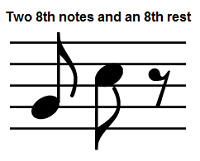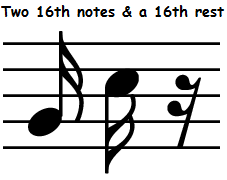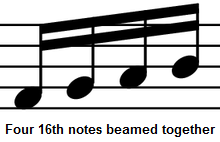So you want to learn to play the piano? Welcome. In this free piano lesson we take a look at rests, note values and time signatures.
Music rests
A rest is an interval of silence in a piece of music, marked by a sign indicating the length of the pause. Each rest symbol corresponds with a particular note value.
My Best Recommendation: Click here for the BEST piano/keyboard course I’ve seen on the Internet.
Types of music rests
Whole rests and whole notes
A whole note is a musical note that lasts for four beats in 4/4 time. A whole rest is silence equal to a whole note.
The whole rest: a dark rectangle attached to a bar line, facing downwards.![]()
Half rests and half notes
A half rest is silence equivalent to the value of a half note. It lasts for two beats.
The half rest: a dark rectangle attached to a bar line, facing upwards.![]()
Learn to play the piano with Piano For All piano lessons.
Quarter rests and quarter notes
A quarter rest is an interval of silence in music that lasts for one beat. Similarly, a quarter note lasts for one beat.
The quarter rest: a squiggly line.![]()
Eighth rests and eight notes
An eight note lasts for half a beat. Likewise, an eight rest lasts for half a beat. It would take two eighth rests to form a rest that lasts for one beat, and similarly, two eight notes to form a quarter note or a note that lasts for one beat.
The eighth rest: a slanted line with a dot.![]()
Sixteenth rests and sixteenth notes
A sixteenth note last for a quarter of a beat. A sixteenth rest is a period of silence in music that lasts a quarter of a beat. It takes four sixteenth notes or four sixteenth rests to make one beat.
The sixteenth rest: a slanted line with a double dot.![]()
As you learn to play the piano you will realize that there’s a lot of simple math involved. As you can see the above is very mathematical.
In a previous piano lesson we looked at quarter, half and whole notes. The following are the images of 8th and 16th notes. They last for half a beat and a quarter of a beat, respectively.
8th notes
An eighth note with stem facing up, an eighth note with stem facing down, and an eighth rest.

Four eighth notes beamed together:
16th notes
A sixteenth note with stem facing up, a sixteenth note with stem facing down, and a sixteenth rest.
Four sixteenth notes beamed together:
(Learn to play the piano with our free piano lessons.)
Next in our free piano lesson we shall watch a video on time signatures and note values. Enjoy.
Watch this lesson:
Click here for my favorite How to Play Piano course. If you want to learn piano the easy way, and not have to endure technical, traditional, boring stuff, I recommend this to you.
Lessons/Pages:
- Free Piano Lessons – Page One
- Online Piano Lessons – Page Two
- Free Online Lessons (Piano) – Page Three
- Beginner Piano Lessons – Page Four
- Easy Piano Lessons – Page Five
- Learn Piano Online – Page Six
- Learn to Play the Piano – Page Seven
- Learn to Play Piano – Page Eight
- Keyboard Lessons – Page Nine
- Beginner Keyboard Lessons – Page Ten
- Learn Piano Online – Page Eleven
- Free Piano Lessons For Beginners – Page Twelve
Learn How to Play The Piano Home Page.